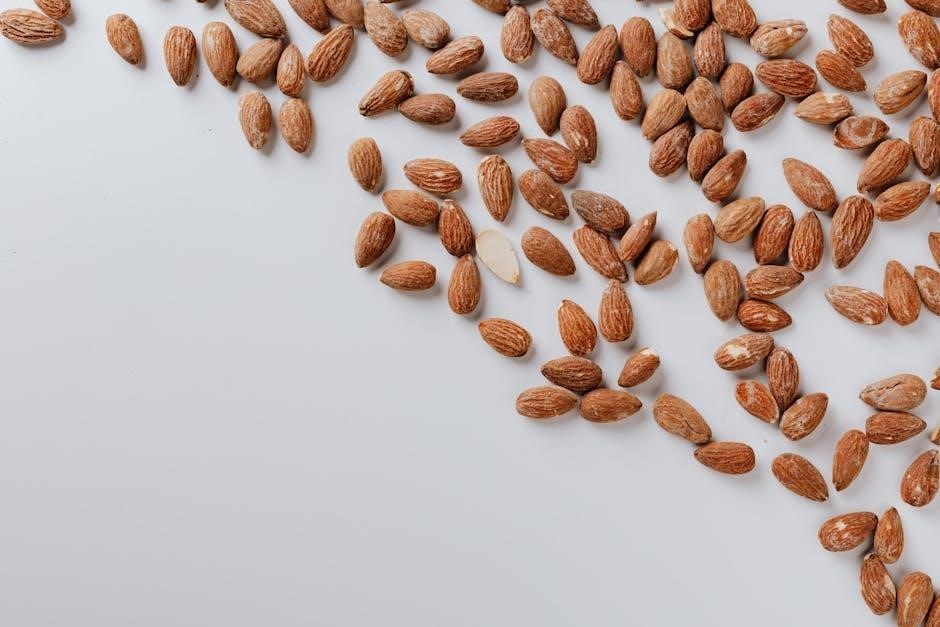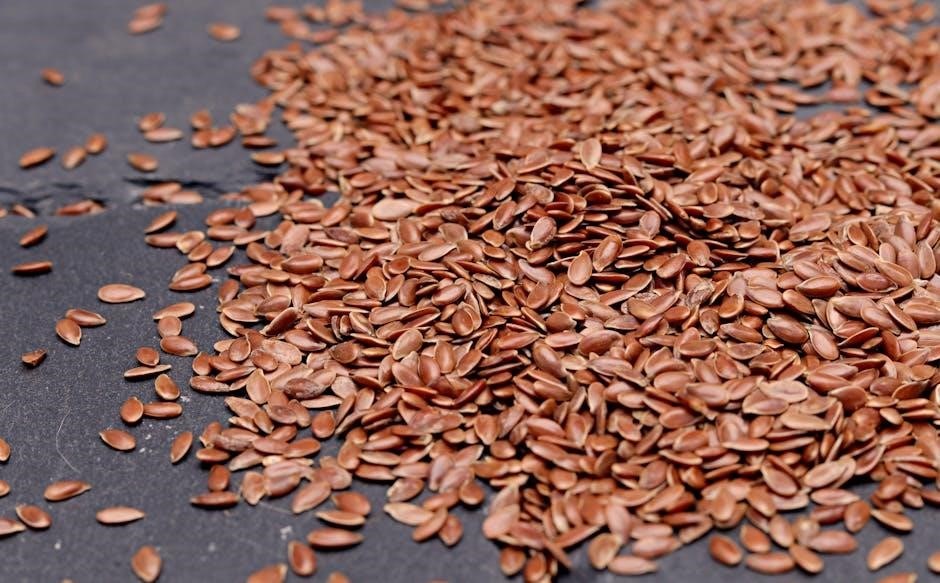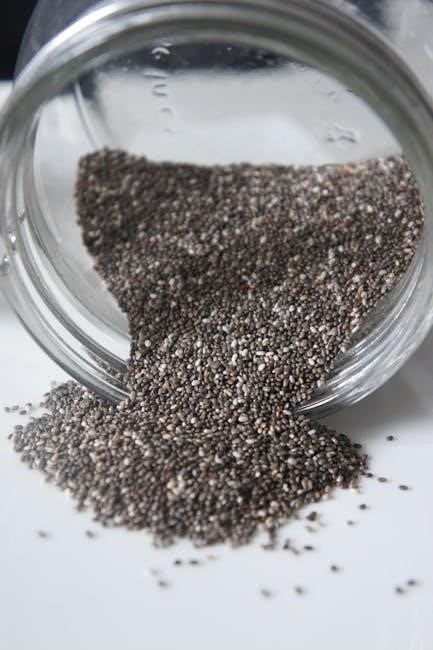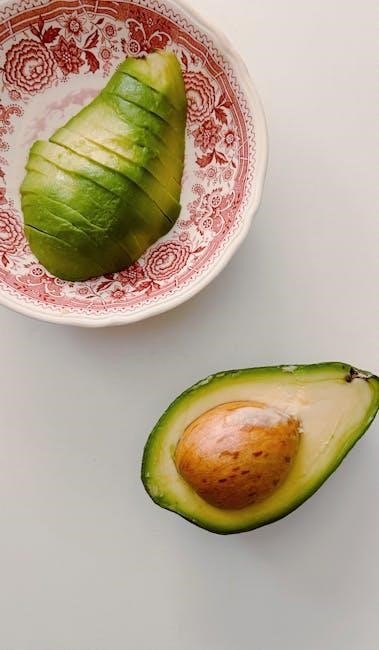7-Day Vegetarian Keto Meal Plan PDF: An Overview
Embark on a transformative journey with our 7-day vegetarian keto meal plan PDF! This comprehensive guide offers a structured approach to achieving ketosis while adhering to a vegetarian lifestyle.
Expect delicious recipes, balanced macronutrient ratios, and clear guidance for success.

Understanding the Vegetarian Keto Diet
The vegetarian keto diet combines the principles of vegetarianism and the ketogenic diet. It prioritizes plant-based protein sources like eggs, dairy, soy and legumes, while restricting carbohydrate intake to induce ketosis for weight management.
Definition of Vegetarian Keto
Vegetarian keto is a dietary approach blending vegetarian principles with the ketogenic diet. It excludes meat, fish, and poultry, focusing on plant-based foods while adhering to keto’s low-carb, high-fat macronutrient distribution. Protein sources include eggs, dairy, soy products, and legumes.
The goal is to achieve ketosis, a metabolic state where the body burns fat for fuel instead of carbohydrates. This requires significantly restricting carbohydrate intake, typically to under 50 grams per day, and increasing fat consumption.
A well-planned vegetarian keto diet can offer potential benefits like weight loss, improved blood sugar control, and increased energy levels. However, careful attention to nutrient intake is essential to prevent deficiencies.
Differences Between Vegetarian, Vegan, and Keto Diets
Understanding the nuances between vegetarian, vegan, and keto diets is essential. Vegetarian diets exclude meat but may include animal byproducts like dairy and eggs. Vegan diets eliminate all animal products, including meat, dairy, eggs, and honey.
The keto diet, conversely, focuses on macronutrient ratios—high fat, moderate protein, and very low carbohydrates—to induce ketosis. A vegetarian keto diet combines these approaches, excluding meat while adhering to keto’s macronutrient guidelines, allowing dairy and eggs.
A vegan keto diet further restricts options by excluding all animal products, posing challenges in obtaining sufficient protein and nutrients within keto’s constraints. Careful planning is crucial when following any of these dietary approaches.
Macronutrient Ratios for Vegetarian Keto
Achieving ketosis on a vegetarian diet requires careful attention to macronutrient ratios. The standard ketogenic diet typically consists of 70-80% of calories from fat, 15-25% from protein, and 5-10% from carbohydrates.
For a vegetarian keto diet, these ratios generally remain similar, but sourcing adequate protein can be a key consideration. Plant-based protein sources like soy products (tofu, tempeh), eggs, and dairy (if included) become staples.
Careful planning and tracking of macronutrient intake are crucial to ensure that the body enters and remains in ketosis. Using a food tracking app or consulting with a registered dietitian can be helpful in maintaining these ratios while meeting nutritional needs.

Benefits of a 7-Day Vegetarian Keto Meal Plan
Adopting a 7-day vegetarian keto meal plan offers numerous benefits. These include weight loss, improved energy levels, and potential enhancement of overall health.
Weight Loss
A 7-day vegetarian keto meal plan is designed to promote weight loss by shifting the body’s primary fuel source from carbohydrates to fats. This metabolic state, known as ketosis, encourages the body to burn stored fat for energy.
By restricting carbohydrate intake and increasing healthy fats, the plan helps to reduce overall calorie consumption and promote satiety, leading to a natural decrease in appetite and cravings. The higher protein content in the meal plan, derived from sources like eggs, dairy, and soy, further contributes to feelings of fullness, aiding in weight management.
Following a structured meal plan also ensures portion control and eliminates guesswork, making it easier to adhere to a calorie deficit, which is essential for effective and sustainable weight loss.
Improved Energy Levels
Transitioning to a 7-day vegetarian keto meal plan can lead to improved and more sustained energy levels throughout the day. Unlike carbohydrate-heavy diets that often result in energy spikes and crashes, a keto diet provides a steadier and more consistent energy source.
This is because the body adapts to using fat for fuel, which is a slower-burning and more efficient process. By minimizing carbohydrate intake, the meal plan helps to stabilize blood sugar levels, preventing the energy dips and cravings associated with fluctuating glucose levels.
Additionally, the emphasis on whole, unprocessed foods in the vegetarian keto meal plan ensures that the body receives essential nutrients and minerals, further supporting optimal energy production and overall vitality. Individuals often report feeling more alert, focused, and less prone to fatigue when following this dietary approach.
Potential Health Benefits
Adopting a 7-day vegetarian keto meal plan may offer a range of potential health benefits beyond weight loss and improved energy. Some studies suggest that ketogenic diets may have a positive impact on blood sugar control, making it a potentially beneficial approach for individuals with type 2 diabetes or insulin resistance.
Additionally, the diet’s emphasis on healthy fats and reduced carbohydrate intake may contribute to improved cholesterol levels and cardiovascular health. Some research also indicates potential benefits for brain health, including improved cognitive function and neuroprotection.
Furthermore, the anti-inflammatory properties of a well-formulated keto diet may help to reduce inflammation throughout the body, potentially alleviating symptoms associated with inflammatory conditions. However, it is essential to consult with a healthcare professional before making significant dietary changes, especially if you have underlying health conditions, to ensure the diet is appropriate and safe for your individual needs.

Sample 7-Day Vegetarian Keto Meal Plan
Explore a sample 7-day vegetarian keto meal plan, featuring delicious and nutritious recipes. This plan will provide a balanced approach to help you reach ketosis effectively.
Breakfast Options
Start your day right with these delicious and keto-friendly vegetarian breakfast options! Our 7-day meal plan includes a variety of choices to suit your taste and nutritional needs. Consider a tofu and strawberry smoothie for a refreshing and protein-packed start, or a savory curry tofu scramble to kickstart your day.
For something quick and easy, explore blackberry coconut breakfast bowls. Omelets filled with cheese and vegetables can provide a fulfilling and low-carb start. We also have low carb whoopie pie pan to whip up little egg patties. These are perfect for low-carb breakfast sandwich buns or for stuffing in an English muffin. These options are designed to keep you satisfied and energized throughout the morning, while staying within your keto macronutrient goals.
Lunch Options
Midday meals on a vegetarian keto diet can be both satisfying and aligned with your dietary goals. Our 7-day meal plan offers diverse lunch choices to keep things interesting. Enjoy the comforting warmth of vegetable bisque or a hearty black bean soup.
For a lighter option, consider a keto grilled vegetable chopped salad with avocado dressing, packed with nutrients and healthy fats. Chia seed crackers with guacamole offer a quick and convenient option, while keto seeded crackers and goat cheese provide a satisfying crunch. These lunch options are carefully crafted to provide essential nutrients and keep you feeling full and focused throughout the afternoon, all while staying within your net carb limits.
Dinner Options
Evenings on the 7-day vegetarian keto meal plan offer a chance to indulge in flavorful and fulfilling dinners. The plan includes options like veggie burgers for a satisfying, protein-packed meal.
Explore the versatility of eggplant with various dishes, from eggplant parmesan (keto-friendly version) to roasted eggplant with herbs and cheese. Cauliflower mac and cheese provides a comforting, low-carb twist on a classic favorite. These dinner options are designed to be both delicious and nutritionally balanced, incorporating healthy fats, moderate protein, and minimal carbohydrates.
Each meal is crafted to help you stay within your ketogenic targets while enjoying a varied and satisfying vegetarian diet. With options like these, dinner will become a highlight of your keto journey.
Snack and Dessert Options
Maintaining a vegetarian keto lifestyle doesn’t mean sacrificing snacks and desserts! The 7-day meal plan includes options like keto-seeded crackers paired with goat cheese for a savory, satisfying snack.
Chia seed crackers with guacamole offer a healthy fat boost and a delicious flavor combination. For those with a sweet tooth, the plan also features keto-friendly dessert options. These snacks and desserts are designed to be low in carbohydrates and high in healthy fats, helping you stay in ketosis while satisfying your cravings.
They provide a perfect balance of flavor and nutrition, ensuring you never feel deprived. Whether you’re looking for a quick afternoon snack or a sweet treat after dinner, these options will keep you on track.

Key Considerations for a Vegetarian Keto Diet
Navigating a vegetarian keto diet requires careful attention to protein sources, carb counting, and essential nutrients. Balancing these elements is crucial for overall health and successful ketosis.
Protein Sources
Identifying sufficient protein sources is paramount when following a vegetarian keto diet. Unlike traditional keto diets that rely heavily on meat, vegetarians must strategically incorporate plant-based and animal-derived (if ovo-lacto vegetarian) protein options to meet their daily needs.
Eggs and dairy products, such as cheese and yogurt, are excellent choices for ovo-lacto vegetarians; For those including plant-based options, soy-based foods like tofu, tempeh, and edamame are nutrient-rich and versatile.
Other plant-based sources include nuts, seeds, and certain legumes, though these should be consumed in moderation due to their carbohydrate content. Combining various protein sources throughout the day ensures a complete amino acid profile, essential for muscle maintenance and overall health. Careful planning and tracking are key to achieving adequate protein intake on a vegetarian keto diet.
Carb Counting
Meticulous carb counting is crucial for the success of a vegetarian keto diet. Since the goal is to maintain a state of ketosis, limiting carbohydrate intake is essential. Unlike standard vegetarian diets, where grains and starchy vegetables are staples, a keto approach requires careful selection of low-carb alternatives.
Focus on non-starchy vegetables like leafy greens, cauliflower, broccoli, and zucchini, which provide essential nutrients without significantly impacting carb counts. Be mindful of hidden carbs in sauces, dressings, and processed vegetarian products.
Accurately tracking carbohydrate intake using food labels and online resources is highly recommended, aiming for a net carb limit, often around 20-30 grams per day. Prioritize whole, unprocessed foods to ensure optimal nutrition while staying within the desired carbohydrate range. Consistent and accurate carb counting is fundamental to achieving and maintaining ketosis on a vegetarian keto meal plan;
Essential Nutrients
Ensuring adequate intake of essential nutrients is paramount on a vegetarian keto diet. Since the diet restricts many commonly consumed foods, careful planning is necessary to avoid deficiencies. Focus on nutrient-dense foods like leafy greens, nuts, seeds, and avocados to obtain vitamins and minerals.
Pay particular attention to nutrients often found in animal products, such as vitamin B12, iron, and omega-3 fatty acids. Consider supplementation to address potential gaps in these areas. Vitamin D, calcium, and zinc are also crucial for overall health and should be prioritized.
Prioritize a diverse range of vegetables and plant-based protein sources to maximize nutrient intake. Regular monitoring of nutrient levels through blood tests can help identify and address any deficiencies. Consulting a registered dietitian or healthcare professional can provide personalized guidance on meeting your specific nutritional needs while following a vegetarian keto meal plan, ensuring optimal health and well-being.
Where to Find 7-Day Vegetarian Keto Meal Plan PDFs
Finding readily available and reliable 7-day vegetarian keto meal plan PDFs is easier than ever, thanks to the abundance of resources online. Reputable health and wellness websites often offer downloadable meal plans created by registered dietitians or nutrition experts. Look for websites that provide detailed recipes, macronutrient breakdowns, and shopping lists.
Many blogs and online communities dedicated to vegetarian and ketogenic diets also share free or premium meal plan PDFs. Social media platforms like Pinterest and Instagram can be valuable sources for discovering visually appealing and informative meal plans.
Additionally, consider exploring online marketplaces like Etsy, where independent creators offer unique and customizable meal plan options. Always prioritize resources from trusted sources and consult with a healthcare professional before making significant dietary changes. This ensures the meal plan aligns with your individual needs and health goals.
